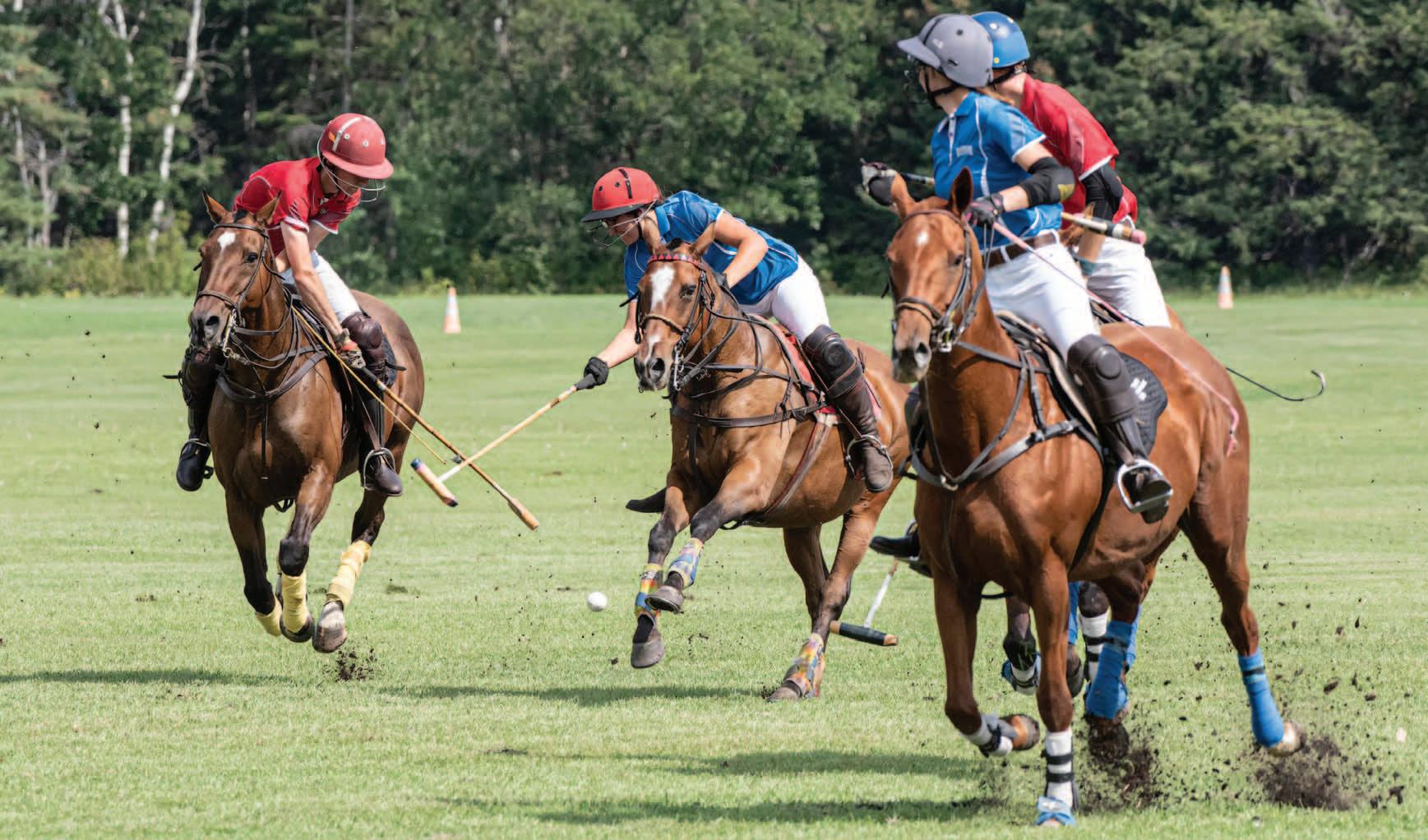
29 minute read
Polo Report
DISPATCHES FROM THE WORLD OF POLO
C ENTRAL
BLUE TRIUMPHS IN SPENCER SMITH MEMORIAL
MACDONALD COLIN
Davis McClarty, far left, and Tia Andrews, middle, tangle in the Spencer Smith Memorial. Andrews’ teammate Katie Smith and McClarty’s teammate Regan Smith are far right.
THE Springfield Polo Club held its 2nd Annual Spencer Smith Memorial at its renowned fields in Birds Hill Provincial Park, in Manitoba, Canada, Aug. 22-23. Two teams played off over two days, ending knotted in a tie and requiring a shootout to name the tournament winner.
Although travel was still permitted within Western Canada, the club made the responsible but difficult decision to avoid inviting out-of-town teams to compete due to rising concerns surrounding the novel coronavirus. With a resolve to continue to honor Spencer Smith, the club member pivotal in shaping the club throughout 30-plus years before losing his fight with cancer in 2018, the club elected to field teams of local players.
Many local members stepped up to take on big roles on the field throughout the season, along with finding more time to exercise and train their horses in the unusual year with open schedules and an absence of hired help for the horses. Ultimately, the involving nature of the year for local club members brought out the best of each member’s playing and riding abilities and it was highlighted during the tournament.
Just as Smith would have liked it when he was managing the fields and organizing the tournaments, the playing surface was immaculate going into Sunday’s final. After ending level at 4- 4 the first day, the teams continued the second day with extremely close

MACDONALD COLIN
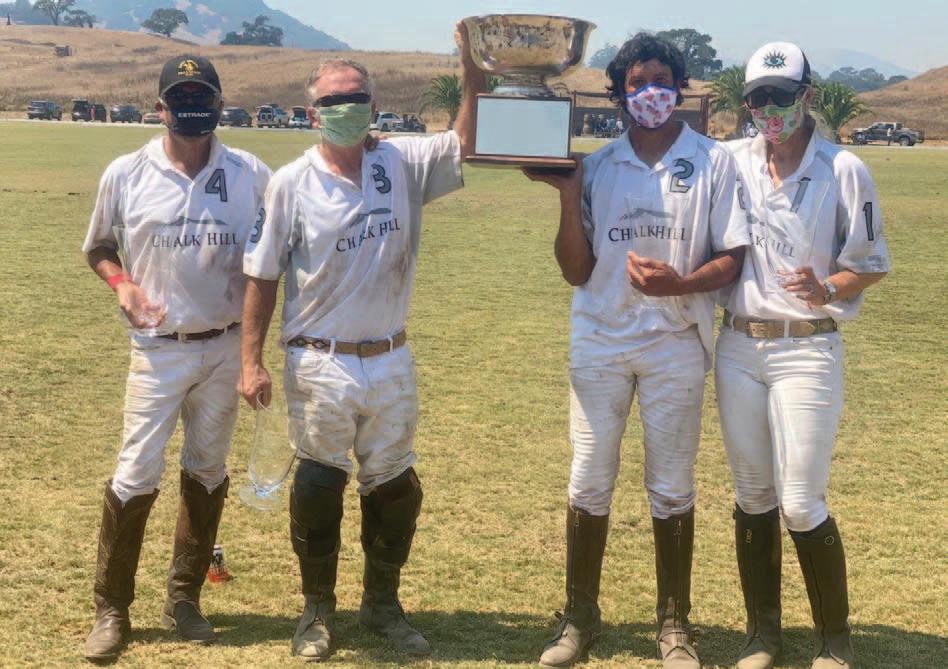
Red’s Lauren King comes in to hook Blue’s Gary Senft in the Spencer Smith Memorial tournament in Manitoba, Canada. Tevis Ranch/Chalk Hill’s Rafael Hernandez, Richard Mansfield, Fabian Lezcano and Elizabeth Mansfield won the Masters Cup.
and competitive play. Red (Regan Smith, Davis McClarty, Bruce King, Lauren King, Jordan Bull, John Keller), captained by 2019 NYTS Championship player Regan Smith, had the 3-2 advantage going into the final chukker but that disappeared when McClarty put a strong back shot into the chest of Garrett Smith and the turnover gave him the chance to send a long cut shot in the goal for the 3-3 tie.
Back and forth action followed with several great runs by young rising stars Tia Andrews and Lauren King but it was another new member, Jordan Bull, who made his mark and put Red up 4-3 with a play across the goal and an open back shot that took a hop and went post-in.
With only a minute to spare, Blue (Garrett Smith, Katie Smith, Gary Senft, Chandler Howe, Tia Andrews) was on the ropes when Katie Smith took a page out of longtime Prairie Polo Club legend Cledwyn Lewis’ book and pulled out the belly shot to tie the game after a mad scramble in front of the goal. A shootout was needed and the fans got a welcome treat as they all took to the field to get a closer look.
True to the theme of the tournament and season, all players on the field for the last chukker participated in the shootout. After two tied rounds, Blue sealed the deal to cheers from friends, family members and local fans spending the day in the park.
The club hopes to return to a threeday format with visiting teams for next year’s edition.
C ALIFORNIA
TEVIS/CHALK HILL ACES MASTERS CUP ACTION
Tevis Ranch/Chalk Hill topped a four-team line up to take the Masters Cup at Cerro Pampa Polo Club in Petaluma, California, on Aug. 22.
The first semifinal match saw Cerro Pampa (Michael LaBlanc, Gregory LaBlanc, Hassan Khan, Ashton Wolfson) fall hard, succumbing to Tevis Ranch/Chalk Hill (Elizabeth Mansfield, Fabian Lezcano, Richard Mansfield, Rafael Hernandez), 12-1.
The second semifinal was much closer with Casa Socas (Ian Breed/Timur Kotelnikov, Katy Mckegney, Will Harris Toto Socas) narrowly edging Baum Squad (Steve Baumhoff, Michael Downing, Cipi Echezarreta, Erik Wright), 6-5.
The final between Casa Socas and Tevis Ranch/Chalk Hill was also very close. Casa Socas began with a handicap goal. Neither team could reach the goal in the first seven minutes. Socas slammed through back-to-back goals in the second but Elizabeth Mansfield and Richard Mansfield each scored to get in the game. Tevis Ranch/Chalk Hill kept the momentum into the third chukker with Elizabeth and Richard each adding another goal and Lezcano scoring one of his own for a 5-3 lead.
Socas trimmed the lead to one in the fourth, 5-4, and the team held Tevis Ranch/Chalk Hill scoreless but was unable to get any closer and Tevis had the win. Lezcano was named MVP.
In the consolation, Baum Squad and Cerro Pampa were tied in the first chukker, but Baum Squad took control to overcome Cerro Pampa for the win.
In other action, Sparkle Unicorns (Eileen Duffy, Lucas Esposto/Tracy Dawson, Rachel Faierman/Nicole Hai, Elizabeth Holson) took on Cerro Pampa (Will Ellis/Jena Watson, Illona Kotelnikov/Marcos Esposto, Jennifer Hahamian, Erik Wright) in the low-goal flight Rosé Cup.
Sparkle Unicorns got on the board with a pair of goals in the first chukker and another tally early in the second. Cerro Pampa struggled to find the goal for the first 10 minutes. Finally, Hahamian broke the drought and put the team on the board in the second. She followed with a lone goal in the third. The team tied the match in the fourth but Sparkle Unicorn got back in the game in the nick of time for the narrow 4-3 win.

.COM POLOGRAPHICS LOMINSKA / DAVID .COM POLOGRAPHICS LOMINSKA / DAVID
Quite on Z’s Paco de Narvaez took home Best Playing Pony honors in the last two legs of the Rincon League. Clavel is shown above.
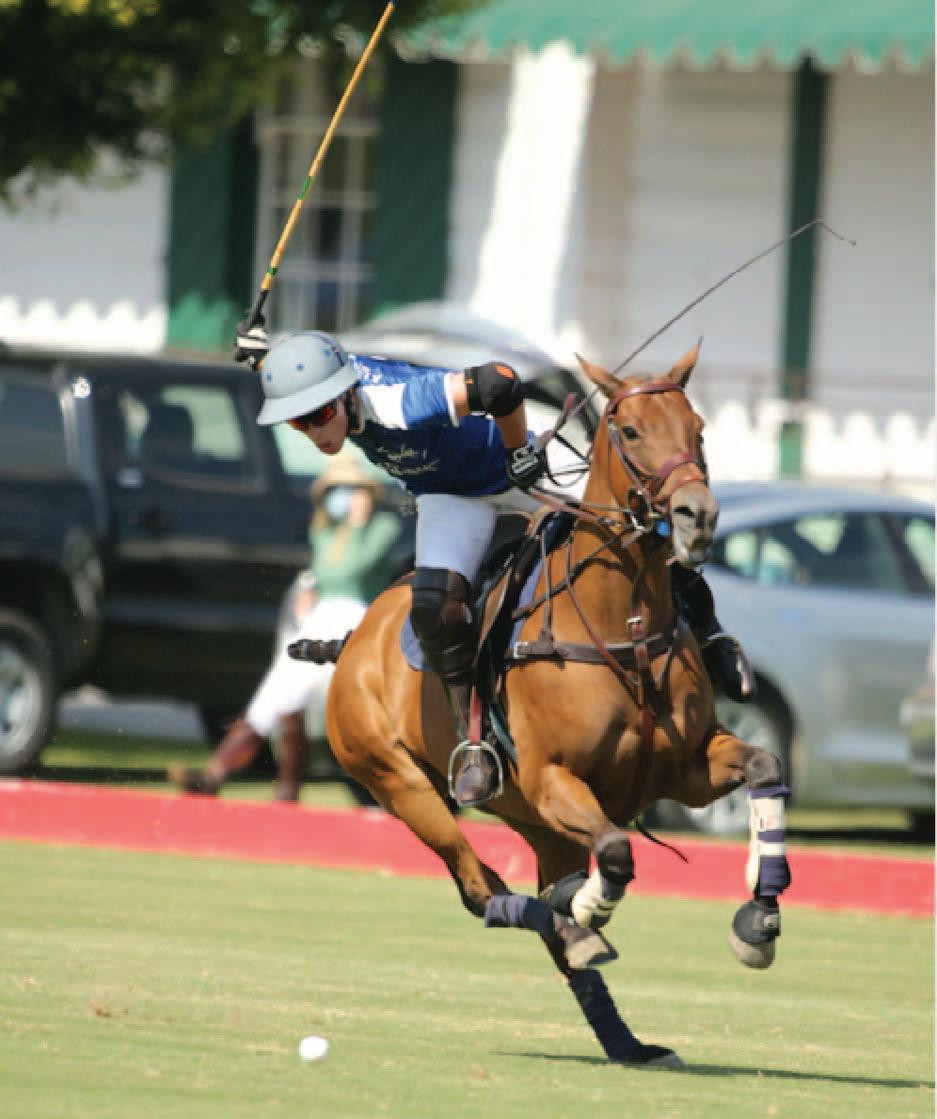
KLENTNER PREVAILS IN MALIBU CUP
After falling to Quite on Z in the James Colt Classic, Klentner Ranch won the fight in the final of the Malibu Cup, part of the 8-goal Rincon League at Santa Barbara Polo & Racquet Club in Carpinteria, California on Aug. 15.
An undefeated Klentner Ranch (Cable Magness, Luke Klentner, Jake Klentner, Jesse Bray) met Quite on Z (Paige Beard, Paquito de Narvaez, Paco de Narvaez, Kristos Magrini) in the final.
Starting out trading goals, Klentner Ranch led 5-3 at the half. Magness came out strong in the second half, tallying three field goals for the Klentner team, with support from three strong teammates. Quite on Z fought back with Paquito de Narvaez scoring a pair of goals and his dad, Paco adding a few more but it wasn’t enough and Klentner proved too tough to overcome.
Klentner won the match, 11-6. Magness was named MVP and Paco de Narvaez’ Poppy was Best Playing Pony.
Rincon action continued with the Montecito Cup, played over two days. Klentner Ranch didn’t play, dropping the roster to five teams. And Matt Yonally took over for John Ziegler on Barrossa. The first match was played as a round robin. Barrossa/Del Padre defeated both Mayer Ranch and Whitehall Ranch to advance to the final while BGBST Law defeated Quite on Z to take the other final spot. Klentner Ranch’s Cable Magness
BFBST Law was named MVP in the Malibu Cup. took advantage of Barrossa/Del Padre’s Quite on Z defeated Barrossa/Del mistakes, capitalizing on five penalties Padre in the first semifinal, while BFBoff the mallet of Luquitas Criado, ST Law advanced over Mayer Ranch added to a pair of goals from Juan Monand Whitehall Ranch in round-robin teverde. Meanwhile, Barrossa/Del play. Padre was having trouble around the BFBST Law kept up the momengoal and trailed, 7-3, at the half. tum, coming out strong in the first half
Barrossa/Del Padre regrouped to lead, 6-4. Quite on Z rallied in the going into the second half. It scored five second half, with Paco de Narvaez tying goals in the fourth and fifth, while holdthe match at 7-7 at the end of the fourth ing BFBST to just two goals. Down by and 8-all at the end of the fifth. The last just a goal going into the last chukker, chukker saw Luquitas Criado and Paco Barrossa/Del Padre tied the match. In de Narvaez trade goals to keep the game an effort to take the lead, Barrossa level. Monteverde broke the tie and Cricaught the umpires’ whistles and BFBado scored an insurance goal with less ST Law took back the lead as Criado than a minute on the clock. converted two penalties in a row. Juan Monteverde was MVP and Paco
Barrossa wouldn’t concede, fighting de Narvaez’s Clavel was Best Playing until the end. It managed another goal Pony. It was the second Best Playing with just under two minutes remaining Pony honor for De Narvaez in as many but time ran out for the team and BFBweeks. ST had the 11-10 win. Luquitas Criado The players that participated in the was MVP and Juan Monteverde’s ScanRincon League voted on End of Season dalosa was Best Playing Pony. award recipients. Paquito de Narvaez
The same teams battled in the was MVP of the league; Jim Wright had Carpinteria Cup, also played over two the Best String; and Cory Willams was days. given the Sportsmanship Award.

.COM BLUECINNABAR STACY / WILLIAM T. .COM BLUECINNABAR STACY / WILLIAM T.
Mother Chukker’s Susannah Forbes helped the team win the Pacific Coast Constitution Cup.
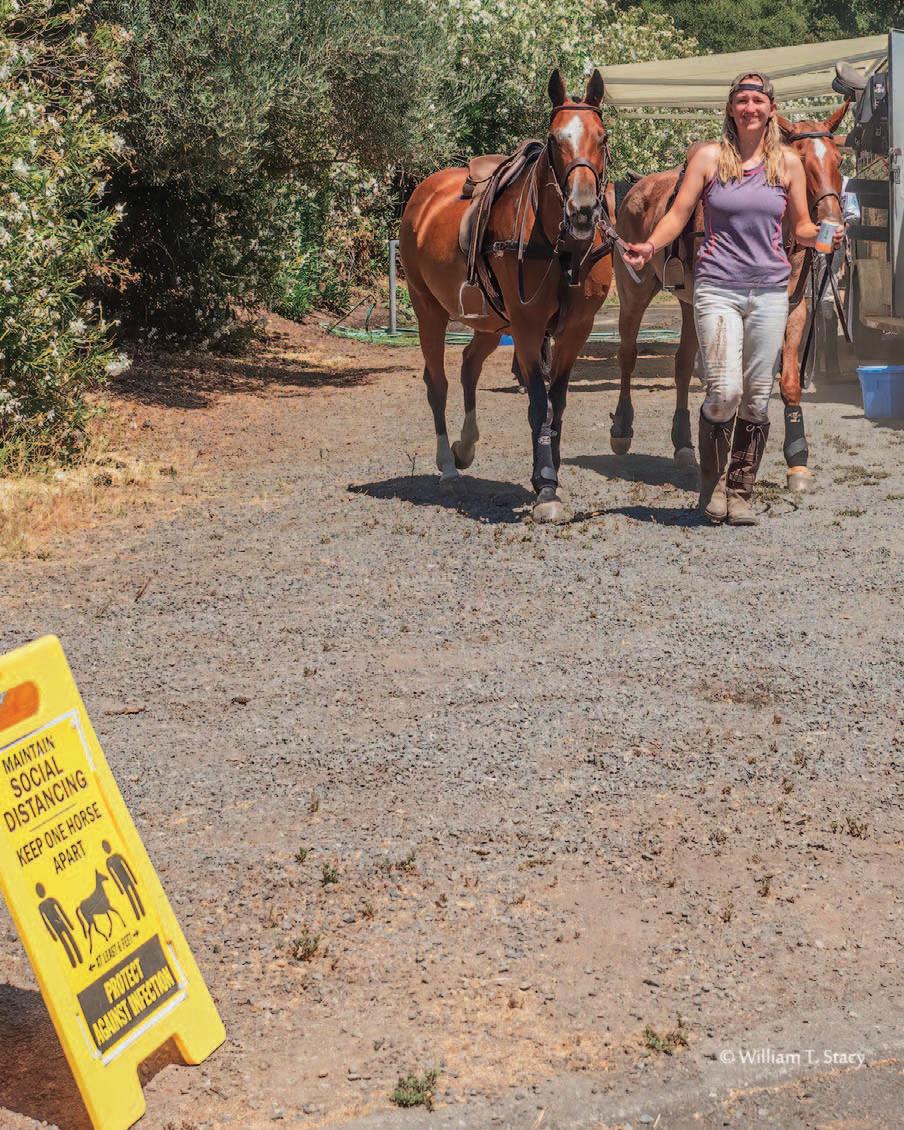
MOTHER CHUKKER WINS CONSTITUTION CUP
Mother Chukker came out on top in the Pacific Coast Constitution Cup at Wine Country Polo Club in Oakmont, California, Aug. 15-16.
Following a late team forfeiture, three teams played in a round-robin format over two days.
Under the watchful eye of USPA umpire Dan Healy, round one saw STG (Waqass Al-Siddiq, Brian McFall, Jack Ziegler, Ignacio Deltour) facing POLOSF (Caroline Vissers, Vladimir Rivkin, Alberto Gonzalez, Leandro Floccari). The game favored POLOSF, with Gonzalez and Floccari always com
.COM BLUECINNABAR STACY / WILLIAM T. Mother Chukker’s Carlos Rivas outruns PoloSF’s Caroline Vissers in the Constitution Cup.
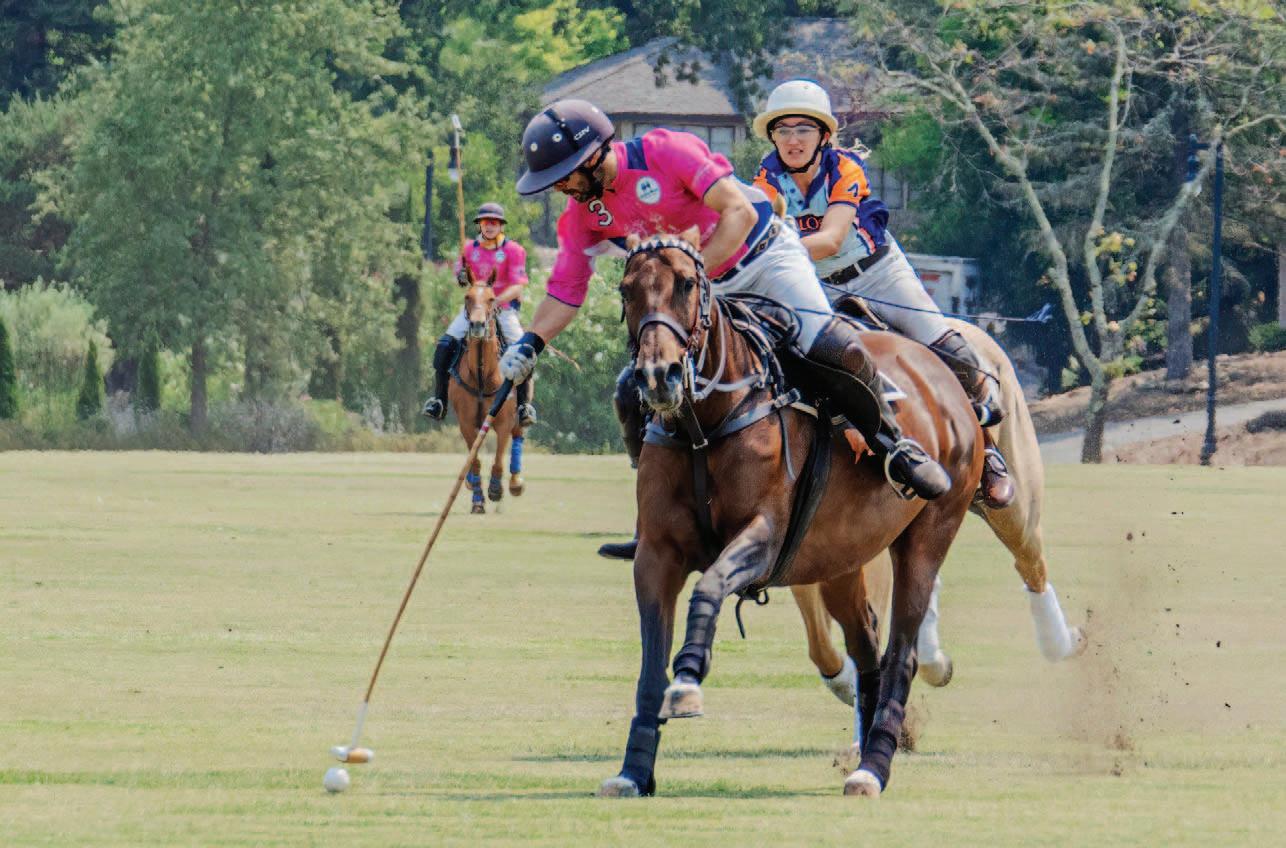
bining to counterattack in response to Deltour’s fancy footwork. Gonzalez’s speed on his selftrained ponies was also noticeable. Players, spectators and staff are reminded to maintain social POLOSF ultimately distancing, keeping at least one horse length apart. prevailed 4-2. Despite efforts by Deltour and his team
In round two, Mother Chukker mates to even the score, plays were (Susannah Forbes, Carlos Rivas, Collin quickly shut down by Guinazu and his White/ Mehrdad Baghai, Francisco team. Guinazu) dominated STG to win, 4-1. In the third round, the winners of Led by team captain Guinazu, Mother the first two games lined up for the Chukker quickly built up an early lead throw-in. Mother Chukker met its in the first chukker, with goals by White match with POLOSF. Again, Gonzalez and Forbes. Mother Chukker then and Floccari were able to break away added to its lead in chukker two. and lead the scoring for POLOSF, especially in the second chukker. Gonzalez outpaced the speed of Rivas, whose string was charging hard, but not quite fast enough. POLOSF won 4-2. Because of an unusual battery of thunderstorms hitting Northern California late Saturday, Sunday’s games were postponed to the following weekend. Meanwhile, those storms ignited one of the worst wildfires in California history–the LNU Lightning Complex fire. While the club was not under direct threat of fire, a thick layer of smoke engulfed the field for over a week, creating a health hazard. The skies eventually cleared and play resumed on Saturday, Aug. 29. The teams with losses on day one of
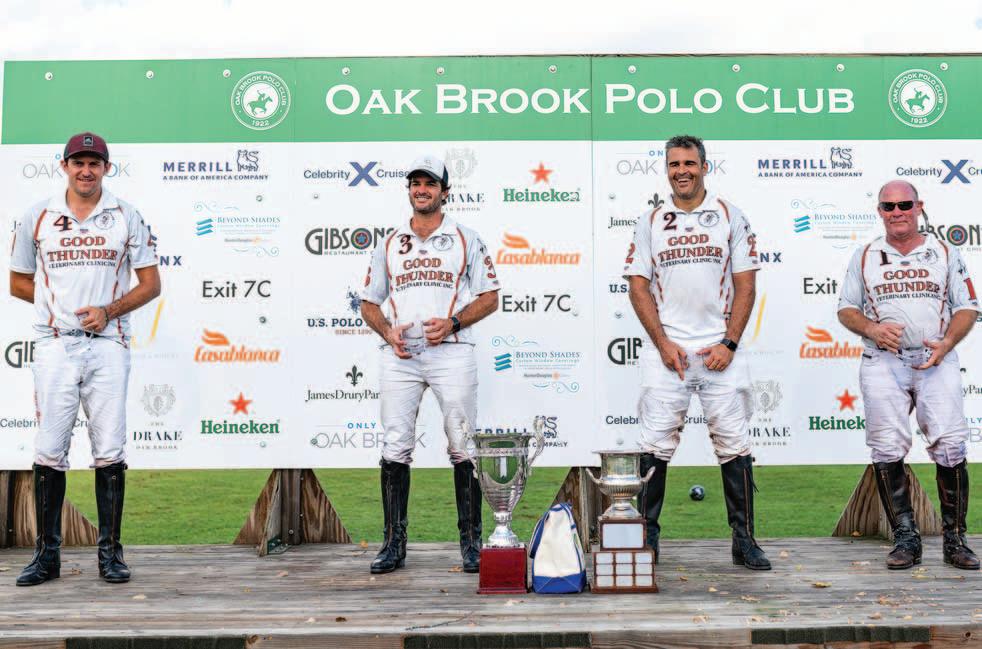
ANDREW MEIER

ANDREW MEIER
Good Thunder’s Tommy Collingwood, Lindo Novillo Corvalan, Miguel Gutierrez and Bill Paterson won the Chicago Open. Good Thunder’s Lindo Novillo Corvalan scored five goals, including the game winner, in the Chicago Open and was named MVP.
the tournament played first. In game one, Mother Chukker edged out STG, 3- 1, with scores by Forbes and White for the winning team and by McFall for STG. In game two, POLOSF outscored STG, 3-2, again with Gonzalez and Floccari leading the charge to goal. McFall and Deltour added a point each for STG, but that was not enough.
By winning the most two-chukker games, the final showdown pitted POLOSF against Mother Chukker. Mother Chukker, having lost to POLOSF previously, decided to turn the tables. With three goals by Guinazu, two goals by Rivas, and one by Forbes, their win was sealed. Gonzalez and Floccari, a powerhouse duo the day before, seemed flat-footed. They added three goals but it was not enough and Mother Chukker took the 6-3 win.
After two days of play Mother Chukker came out on top with 15 goals, POLOSF was close behind with 14, and STG had 6. Club president Paul Griffin presented the trophies to the winners. All teams received local wine and a specialty halter. Field owner and club patron Victor Trione was also present to congratulate the players. Pleased with the overall quality of play and sportsmanlike conduct on the field, Trione commented, “This is what it’s all about. Top flight polo combined with a strong spirit of friendship and comradery.”
C ENTRAL
GOOD THUNDER CRACKS CHICAGO POLO OPEN
Good Thunder took the win in the 12-goal Chicago Polo Open at Oak Brook Polo Club in Oak Brook, Illinois, Aug. 16.
The final was between Good Thunder (Bill Paterson, Miguel Gutierrez, Lindo Novillo Corvalan, Tommy Collingwood) and Oak Brook (James Drury, Mariano Gutierrez, Tomas Obregon, Horacio Onetto).
The match featured the traditional opening ceremonies and activities, including a team parade, the National Anthem sung by Reid Taylor and champagne sabering by WGN TV’s Lauren Magiera.
The first chukker got off to a quick start with Obregon scoring the first goal. Mariano Gutierrez responded with a goal to end the first 1-1. Miguel Gutierrez scored back-to-back goals to give Oak Brook a 3-1 lead. Collingwood scored to cut the deficit to one, 3-2. Good Thunder took the lead in the third with goals by Collingwood, Paterson and Corvalan. Obregon squeezed a goal in before the half ended with Good Thunder ahead, 5-4.
Onetto tied the match early in the fourth, but Corvalan scored two in a row to push ahead, 7-5. Miguel Gutierrez and Onetto scored in the fifth to knot the score at 7-all. Obregon gave Oak Brook the lead in the sixth, but it was short-lived as Corvalan hammered in back-to-back goals for the 9-8 victory.
Corvalan, who scored five goals in the afternoon, was MVP. Collingwood’s Avispa was Best Playing Pony.
Play continued with the 4-goal Masters Cup and the 8-goal Sportsmanship Cup. The finals of both were held on Aug. 30. A benefit match was held that afternoon for former player Tony Sekera. The annual Team Up for Tony benefit raised $50,000 for Sekera, who was injured in a riding accident in 2017.
In the Masters Cup, Elk Grove-Sanfilippo (Courtney Rohs, Roueen Rafeyan, Lindor Novillo Corvalan, Adam Kaminski) took on Brinker Hill Farm (Kelcey Roberts, RJ Roberts, Christian Aycinena, Pedro Manion).
Brinker Hill got off to an aggressive start with three goals, the first from Aycinena, followed by a Penalty 2 conversion from Kelcey Roberts and a goal from Manion. Kelcey and RJ Roberts both added goals in the second, while Elk Grove continued to be shut out, ending the half, 5-0.
Neither team was able to score in the third chukker, but Corvalan came alive in the fourth, scoring a hat trick to cut
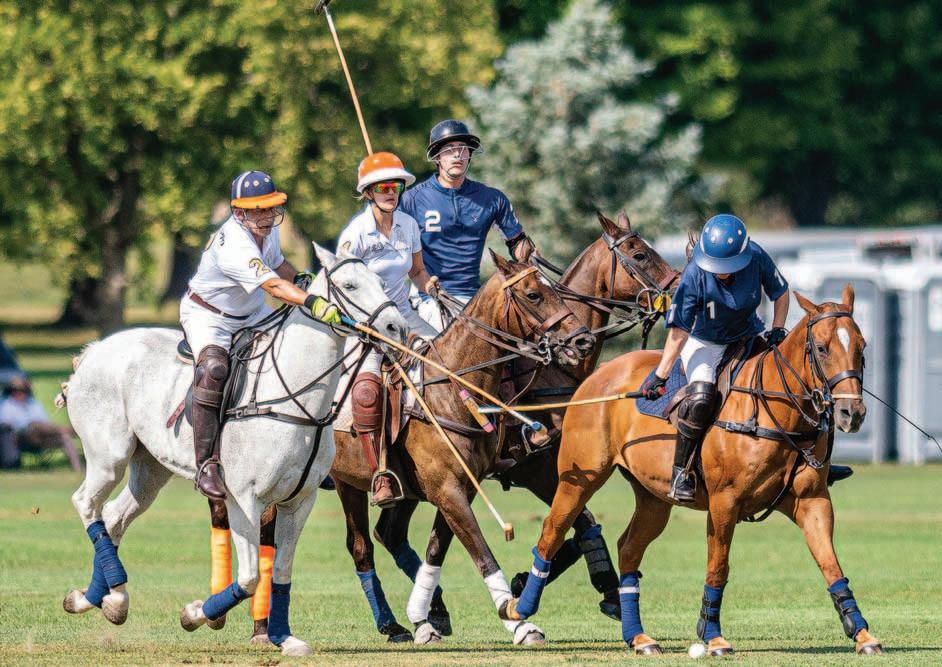
ANDREW MEIER
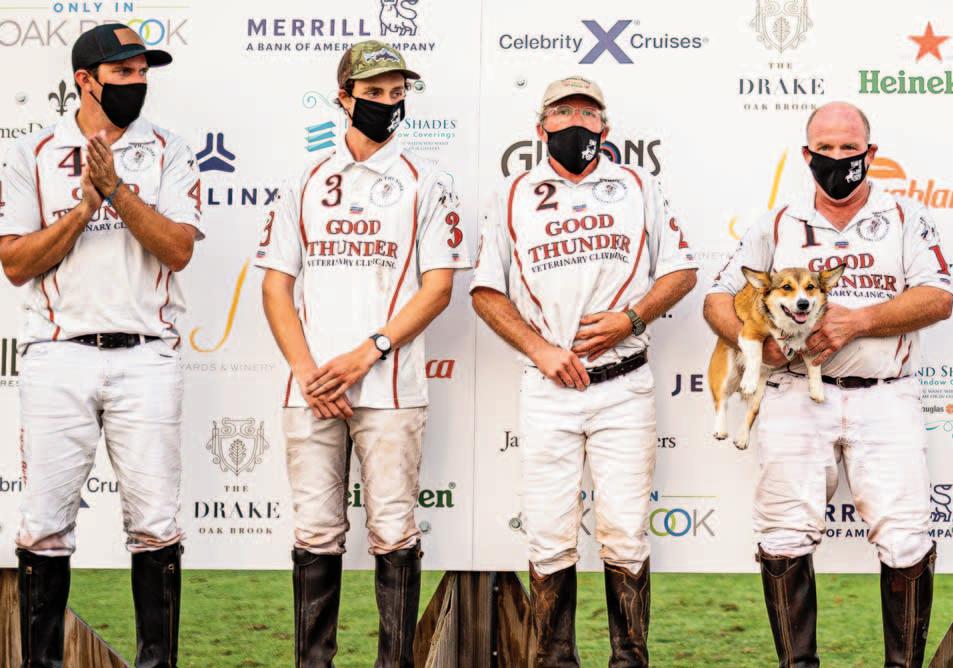
ANDREW MEIER
Brinker Hill Farm’s Kelcey Roberts, backed up by teammate Christian Aycinena, leads the pack in the Masters Cup final. Morgan Creek-Good Thunder’s Tommy Collingwood, Cristobal Consiglier, Tod Rackley and Bill Paterson won the Sportsmanship Cup.
the difference. With time winding down, Manion scored one last time to give Brinker Hill the 6-3 win.
RJ Roberts was named MVP and Corvalan’s Pico Blanco went home with the Best Playing Pony blanket.
In the Sportsmanship Cup, Oak Brook (Jim Drury, Samantha Falbe, Mariano Gutierrez, Tomas Obergon) took on Morgan Creek-Good Thunder (Bill Paterson, Tod Rackley, Cristobal Consiglier, Tommy Collingwood).
Collingwood struck first and Rackley followed with a Penalty 3 conversion. Collingwood added another in the second before Obregon put Oak Brook on the board with three in a row to tie the score at 3-3. Gutierrez scored a lone goal in the third to put Oak Brook ahead, 4-3, at the half.
Rackley tied the score early in the fourth, but Drury gave the lead back to Oak Brook. It was short-lived however as Consigliere tied the match for the third time. Collingwood and Obregon traded goals, keeping the score level going into the fifth. Collingwood then swapped goals with Gutierrez before Rackley shot in back-to-back goals to give Good Thunder a 9-7 lead. Rackley traded goals with Gutierrez in the sixth, but Oak Brook could get no closer, and Morgan Creek-Good Thunder had the win.
Collingwood took MVP honors and Obregon’s M&M was Best Playing Pony.
E ASTERN
NEW HOPE TOPS ARBY DOBB CUP
Tinicum Park Polo Club in Erwinna, Pennsylvania, held its annual USPA 4-goal Arby Dobb Cup, July 21-25.
Five teams competed in the event. In the first preliminary match Tinicum Park ((Erica Lipton, Laura Willson, Ahmed Mounkadi, Cheryl Arnold) fell to Boothwyn Pharmacy (Jose Cervantes, Brook Burke, Alan Medina, Manuel Ontiveros), 7-2.
Boothwyn Pharmacy had a tougher time against Barefield/Stars Aligned (Val Washington, Mark Mulligan, David Halliday, Mauricio Diaz). Barefield scored two goals early, nearly making up for the 2½-goal handicap given to Boothwyn. But Boothwyn kept pace with Barefield/Stars Aligned for the rest of the game, holding on to the half-goal difference for the win, and earning a spot in the final.
Harkwood (Kirk T. Hoffman, Barclay Knapp, Leandro Berrios, Juan Martinez-Baez) faced New Hope (Rhea
New Hope’s Trevor Reeves handles the ball while being pursued by Hawkwood’s Barclay Knapp in the Max Berger Cup final.
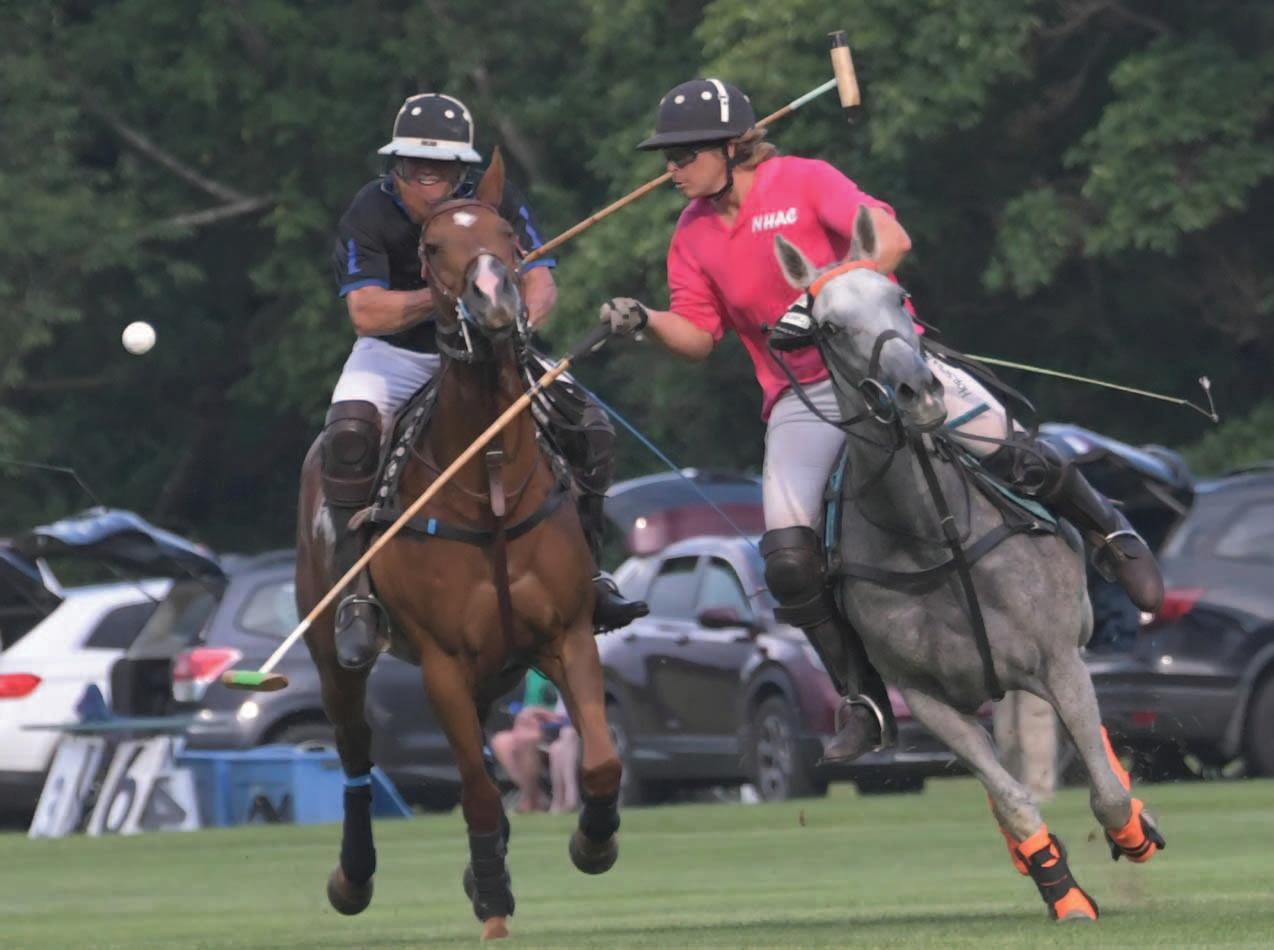
VERGARA D. JEAN

Cessna’s Miki Astrada, Chip Campbell, Miguel Astrada and Gonzalo Teves won the Gallatin Ranch Cup.
Bendabout’s Gillian Johnston, Julian de Lusarreta, KC Krueger and Steve Krueger won the Bradford Brinton Memorial.

Lowenthal, Tim Cheromcka, Trevor Reeves, Nate Berube) in a battle for the other final spot. The game started out close but New Hope pulled ahead to double up Harkwood, 8-4. Reeves scored seven of New Hope’s goals.
Hawkwood played Barefield/Stars Aligned in a fast-paced consolation match. Hawkwood prevailed 5½-3.
New Hope traded its hot pink jerseys for red ones with a sheep dog emblem representing the cup’s longtime sponsor. Arby Dobb’s Greg Krugg and his family and Mike Brady have been club sponsors for over 20 years.
The teams lined up under the watchful eyes of umpires Dennis Santana and Marcos Bignoli. Medina put Boothwyn Pharmacy on the board, but Berube answered. Boothwyn continued to play well but the chemistry between Reeves and Berube proved too tough to beat and New Hope took the 9-4 win.
Reeves was MVP and Ontiveros’ Gabby was Best Playing Pony.
The previous week, four teams competed in the USPA 4-goal Max Berger Cup. Players, dedicated to supporting the longstanding tournament and enticed by USPA prize money, signed up despite rain delays and the obstacles of COVID-19 regulations.
Barefield (Val Washington, Mark Mulligan, Dario Sotomayor, Mauricio Diaz) fell to Hawkwood (Barclay Knapp, Talha Chaudhry, Leandro Berrios, Juan Martinez-Baez), 8-4½, in the first semi.
The other semifinal saw New Hope (Rhea Lowenthal, Dennis Santana, Trevor Reeves, Tim Cheromcka) overpower Boothwyn Pharmacy (Jose Cervantes, Alan Medina, Manuel Ontiveros, Brook Burke), shutting it out and holding it to the handicap it was given, ending 6-2½.
Barefield and Boothwyn Pharmacy settled for the consolation, with Barefield prevailing.
In the final, Hawkwood faced New Hope. Hawkwood took control in the first half. New Hope rallied in the second half, outscoring Hawkwood, but it was unable to make up for the first half deficit and Hawkwood took the trophies. Hawkwood also took the largest share of the tournament prize money, part of the USPA’s COVID-19 tournament stimulus. Juan MartinezBaez also took the MVP trophy.
PACIFIC NORTHWEST
CESSNA TRIUMPHS IN GALLATIN RANCH CUP
Father and son, Miguel and Miki Novillo Astrada, led Cessna to victory in the Gallatin Ranch Cup at Flying H Polo Club in Big Horn, Wyoming, Aug. 8. The Astradas were joined by Chip Campbell and Gonzalo Teves.
The team took on The Villages (Paige Boone, Frankie Bilbao, Steve Krueger, Craig Duke) in the final after giving them a five-goal handicap. The Astradas jumped right out in the first chukker, scoring four goals to chip away at the deficit. Krueger added a goal for the The Villages to keep out front.
The dynamic duo kept up the pressure in the second, combining for three goals but The Villages made the most out a pair of open-goal penalties off the mallet of Boone to maintain a narrow lead. Campbell sunk a Penalty 3 in the third and Miguel Astrada split the uprights but Bilboa sunk a Penalty 4, ending the half, 9-9.
Teves and Campbell took over in the fourth, combining for three goals while The Villages was silenced. The fifth chukker kept the umpires’ whistles busy, with Boone sinking a trio and Campbell a pair—all open-goal penalties. Leading by two, Miguel Astrada sunk a final goal, the only one of the sixth, to seal the victory, 15-12.
Steve Krueger was MVP and his mare Sophie was Best Playing Pony.
In the consolation rounds, Parrot Heads (Roni Duke, Jeff Blake, Malia
Bryan, Pite Merlos) edged Jan Pamela (Wayne Garrison, Will Johston, Lucio Benedit, Hector Galindo), 10-9, in the Circle V Cup; and Clearwater (Camp Campbell, Sugar Erskine, Nico Saenz, KC Krueger) slipped Bendabout (Tom Sprung, Gillian Johnston, Carlitos Galindo, Julian de Lusarreta), 13-12. In the latter match, Camp Campbell was MVP and Galindo’s Paparazzi was Best Playing Pony.
Action continued in the Bradford Brinton Memorial the following week. Bendabout (Gillian Johnston, KC Krueger, Steve Krueger, Julian de Lusarreta) faced Parrot Heads (Roni Duke, Camp Campbell, Nico Saenz, Pite Merlos) in the final.
Bendabout jumped out to a 4-1 lead in the first chukker. It added three more in the second, while Parrot Heads was held to a single penalty conversion. Johnston and Steve Krueger traded goals with Saenz in the third, ending the half, 9-4. Merlos took control in the fourth, scoring three goals while Bendabout was held to one. But that flipflopped in the fifth, with Bendabout outscoring Parrot Heads, 3-1, thanks to strong team play.
Trailing 13-8 going into the sixth, Parrot Heads had another strong chukker but it wasn’t enough and Bendabout had the 14-11 win. Saenz was MVP and Johnston’s Wizard was Best Playing Pony.
In the consolation Red Grade Cup, Evergreen (Tom Sprung, Malia Bryan, Carlitos Galindo, Miguel Astrada) defeate Jan Pamela (Wayne Garrison, Mia Astrada, Sugar Erskine, Hector Galindo), 12-7. Sprung was MVP and Garrison’s Maggie was Best Playing Pony. Carlitos Galindo led Evergreen with a game-high six goals.
In the consolation Turban Creek Challenge, No Trees (Chip Campbell, Gonzalo Teves, Jeff Blake, Craig Duke) beat The Villages (Paige Boone, Will Johnston, Lucio Benedit, Frankie Bilbao), 13-11.
O BITUARY
RUTH DALSKY

Ruth Ann Dalsky of Keswick, Virgnia, passed away peacefully at home Jan. 1, at the age of 58 after a brief courageous battle with brain cancer.
Born Dec. 9, 1961, in Chicago, Illinois, she was the only child of Jean M. Dalsky and Benno W. Dalsky. Ruth earned a bachelor of science degree from Northern Illinois University and a masters from University of Virginia. An inquisitive mind made her a lifetime learner with additional studies at William and Mary’s Marine, Piedmont Community College and UVa.
After a career as a counselor in the nutrition clinic, Ruth joined the court system as a magistrate in the Charlottesville office 12 years ago.
Ruth will be remembered for her wide variety of interests, sense of humor and quest for living. Her love for animals kept her house and barn overflowing with dogs, cats, tropical birds, horses and others that needed a home.
Along with Rita Mae Brown, Ruth co-founded the Piedmont Women’s Polo Club in 1988. It was made up of a handful of women, playing mostly on borrowed ponies in a borrowed facility. In later years, the club leased the Virginia Polo Center from May through August.
Active for over 20 years, the club played arena polo with Saturday night matches open to the public. At its highest, there were 36 members, including 10 non-playing associate members.
“Ruth Dalsky mentored many of us women. With her help and encouragement, I was able to be a playing member of the club and could stable my mare in her string,” said friend Patrica Poindexter. “I did a six-hour commute from the Blue Ridge Mountains to Charlottesville, Virginia, twice weekly. Ruth was one of the most important people in my life and I am in her debt forever.”
A pianist from childhood, Dalsky added accordion, guitar, bass, cello, violin and harp to her music room. Plants filled every room and garden space. She was keenly interested in computers, animation, robotics and every new electronic development.
Ruth was predeceased by her father. She is survived by her mother and dearest friend Nancy Eismann, whose help over more than 25 years enabled Ruth to earn an abundance of happy living into a shortened lifespan. •

EISMANN COURTESY OF NANCY
Ruth Dalsky at the Virginia Polo Center.
(continued from page 19)
Putting up alfalfa hay
Glenn Shewmaker, State Forage Specialist, University of Idaho, says stage of maturity at harvest is important. “If you are putting up your own hay, as soon as alfalfa starts to bloom it’s time to cut that field. Don’t wait any longer, because once it starts to bloom most of the yield increase is stem. When alfalfa is this mature, horses do more sorting when you feed it; they’ll try to eat just the leaves and sort out the larger, coarser stems.” If alfalfa is too mature you also lose a lot of leaves if they shatter, or if the wind is blowing while you’re feeding the hay or if the leaves fall off the stems and get trampled on the ground or into the mud.
He recommends cutting mixed hay based on a compromise between maturity stage of the alfalfa and the grass. However, when alfalfa starts to bloom, it should be cut, even if the grass isn’t quite ready. Alfalfa usually matures quicker, starting to bloom before the grass is in the boot stage. If you wait until you see that first bloom in the alfalfa you are giving up about 20% of potential biomass for the grass, but still have a high quality feed that works well for horses. The grass is very high quality when cut at boot stage because there are fewer stems. The alfalfa is a little bit into the bloom but this makes a nice feed mix, and it is high enough in protein for any horses.
“The main factor is plant maturity, for determining forage quality. The cutting also makes a difference. In an arid climate there’s usually less mold on the standing plant in the later cuttings, due to the dry heat of summer. Sprinkler irrigation can change that a little, but there is still less mold on the growing alfalfa,” he says. There are a few molds that may contain mycotoxins, which can be harmful.
“It’s usually much easier to get second and third cuttings dry for baling, since by then you have warmer temperatures, more radiation, the hay is lighter (not as heavy and dense) so it dries quicker. If you can get it dry quickly, then catch it with dew on it for baling (just a little moisture to help hold the leaves on and keep them from shattering), this makes ideal harvest conditions.” Most hay producers in an arid climate like to bale in late evening
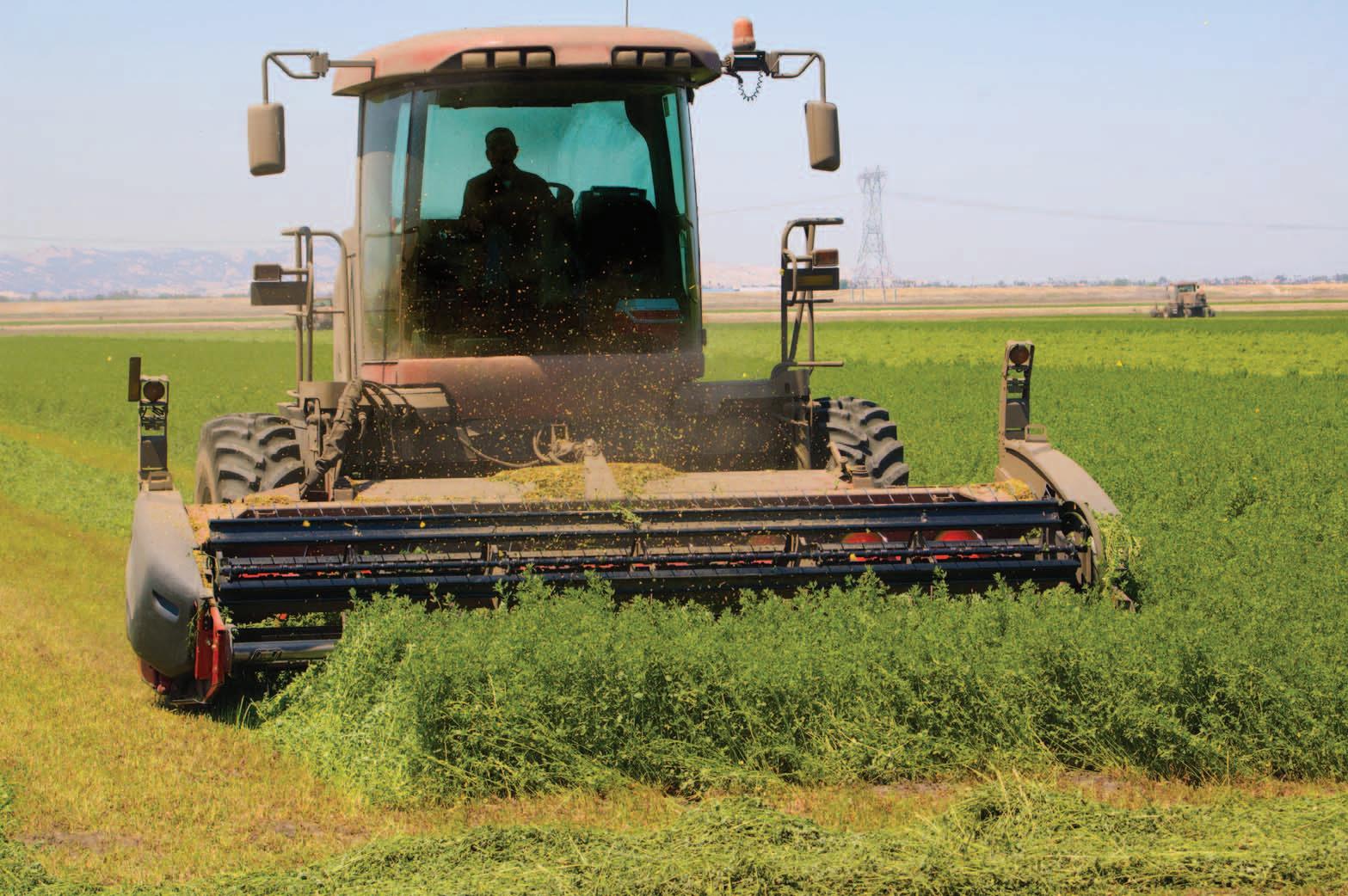
just as the dew comes on, and then quit when the dew gets heavy.
In eastern parts of the country where there’s more rain and a humid climate it’s harder to get hay dry. “If hay growers are diligent and focus on moisture content they can still get it accomplished. Using a really wide swath spreads the hay more thinly so it can dry easier. They can put up good quality hay that way in three days.”
Hay too wet creates mold spores that billow into the air when the bale is opened, and hay too dry can be dusty just from leaf shatter. Another factor that can create dust in hay is cutting it too close to the ground and picking up dirt. “Some of the rotary mowers put a lot of dirt into the windrow. The way those rotors turn, they pick up soil from gopher mounds and uneven ground. For horse hay, it’s best to use the old sickle bar mowers or swathers. Raking is also crucial (whether raking it into a windrow or raking two windrows together with a ground-driven rake). Some people have the rake set a little too low, and this can also kick a lot of soil into the windrow.”
problem is not due to the alfalfa but to the mold that may occur on legumes in humid conditions.
Selecting alfalfa
The main things to look for include leaf to stem ratio, and whether the hay is clean and bright with no dust or mold. “It should be green, meaning there are more leaves and the hay is not weathered or rained on before it was put up,” says Smith. “Many types of hay, but particularly alfalfa, can be dusty just because it was too dry when baled. You don’t want it too wet or it will mold, or too dry because then the leaves shatter.” The crumbling, dry leaves create dust.
“Square bales, large or small, are generally easier
Blister Beetles
These flying insects contain the toxin cantharidin, which can kill a horse if very many beetles are consumed. They feed on alfalfa blossoms and can be a problem if a swarm of them are in an alfalfa field at the time of harvest. Some will be killed by the haying equipment and could end up in the hay.
Some years are worse for blister beetles, especially following a drought-- because grasshopper populations are higher during a dry year (they don’t survive as well in wet conditions), and blister beetle larvae overwinter by feeding on grasshopper eggs. Irrigated alfalfa fields in Western states are often adjacent to drier pastures or rangelands where there are lots of grasshoppers. If an abundance of grasshopper eggs were laid, the blister beetle larvae thrive, and greater numbers survive. A hot or dry year with lots of grasshoppers is often followed by increased numbers of blister beetles the next haying season.
Adult blister beetles emerge in June (sometimes a little earlier or later depending on region and climate) to feed on alfalfa blooms. “These beetles tend to be more prevalent in late summer. The first (and sometimes second) cutting of alfalfa almost never contains blister beetles because it’s generally cut and baled ahead of when the adult blister beetles emerge,” says Smith.
There are many species of blister beetles, but only a few cause problems because they travel and feed in swarms. If there are a lot of blister beetles in a
Blister Beetles can kill a horse if consumed. They can be a problem if they swarm in an alfalfa field at the time of harvest.


certain area, hay can be cut pre-bloom to avoid beetles in the hay. When purchasing hay, examine a few bales to see if the alfalfa has blooms.
Even though there is a lot more risk for blister beetles if alfalfa has bloomed, 99% of that hay won’t have blister beetles in it. The beetles travel in a swarm together and will only be in one area in that hayfield. If there are beetles in the hay, they will end up in just a few bales, rather than throughout the bales from that field. You might feed most of the bales from that field, without a problem, and then find a few bales that are loaded with dead beetles. “If you always check the hay as you feed it, you can discard those bales or flakes of hay that contain beetles. The beetles will be very concentrated in the hay; if you find one or two you will usually find many,” says Smith.
All blister beetles contain cantharidin. “The difference is that some species fly around together in swarms, versus a single beetle here and there,” says Smith. None of them contain enough cantharidin to kill a horse. The problem occurs when the horse consumes multiple beetles. Also, there is a variation in size of different kinds of blister beetles, as well as variation in concentration of cantharidin, and it’s not uniform through a given species.
“Many farmers who grow alfalfa hay are now using management, and in some cases insecticides, to control blister beetles. It’s rare today that these beetles are an issue, except in the central U.S. (Kansas, Oklahoma, Nebraska). If you are getting a new batch of alfalfa hay, however, it’s always good to look at it and check for beetles,” says Smith.
“Producers who market hay for horses are aware of the issue of blister beetles. The biggest risk might be when buying from someone who has just started in the hay business (or when horse owners put up hay themselves) without looking in the fields at harvest time. Always follow the recommendations in your state regarding scouting for and controlling blister beetles,” he says.










